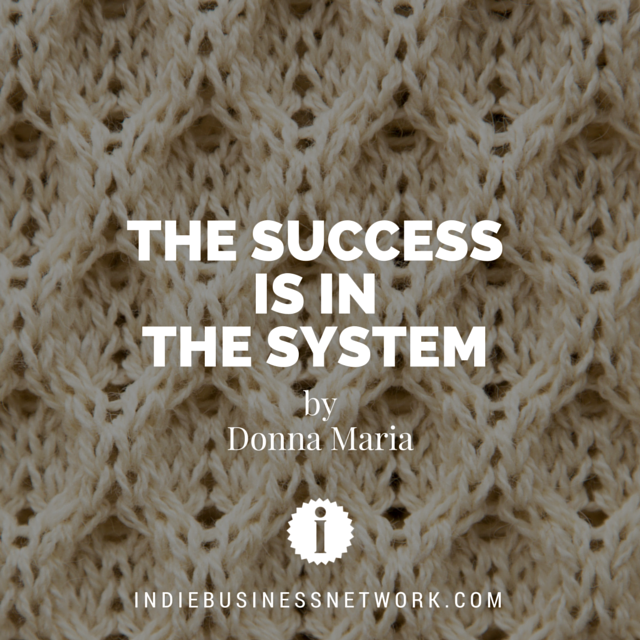Other than incredible relationships, the things that have contributed most to the long-term success and sustainability of my business are the systems I use to manage it. Your success is in your systems, and this post is about helping you implement the systems you need to enjoy success as an entrepreneur.

When I quit my job many years ago to open a retail store, the only systems I had in place were opening time, closing time, and count money time. I didn't keep those systems consistently, and when I met my future husband, I began to close up shop whenever I felt like it so I could hang out with him. (Bad move.) I received hate notes from customers who had traveled for miles to make purchases — based on my business hours.
My customers relied on my system. They built their discretionary time around my system, and I had failed them. That was my first lesson in the power of systems. Today, ninety percent of what I do to sustain and lead the Indie Business Network revolves around some kind of system.
Your Success is in Your Systems
Each episode of the Indie Business Podcast is part of a season. Each season has a theme, such as Women, Wealth and Wow and Makers On Main Street. Each season consists of twelve episodes. That's the system.
I host #MakerBizChat on Wednesdays at 8pm ET on Instagram. I post an Action of the Week every Monday in our Secret Facebook Group. Each time I publish a blog post, I share it immediately in all of my social media outlets. See? More systems.
I could go on and on, but you get the idea. Whether you make and sell products or services, your success is in your systems. Here are the characteristics of sustainable systems that make a business run more smoothly and maximize the chances of long-term success.
”
Donna Maria, Indie Business Network
1. They are purpose-driven
Each action taken in your business must have a specific purpose. For example, if you blog, know why you blog so you can measure the return on that investment. If you add an ingredient to a specific product, add it because it has a specific purpose in making that product perform the way your customers want it to perform.
2. They are specific
Whatever you do, tie it to specific outcomes so it is easy to measure whether or not it is working for you. If there is no specific purpose to an action or series of actions, or if it is not working for you, drop it from your list of things to do.
3. They are simple and easy to duplicate
Make each step in your system so easy that anyone can perform it. Make them easy to duplicate. This is important because you will want to be able to hire people to implement your systems. The simpler the systems, the less chance of error.
4. They are logical
Make sure your systems are composed of sequential steps that logically flow, one behind the other. There should be an easy to identify pattern. Write down each step in the system, and as you perform them over and over again, make changes to the system as you improve it. Each minute spent doing something for your business is a cost to your business. As your systems improve, your costs decrease, and that means you make more money.
5. They are sustainable
Your systems need to be sustainable over the long-term of your business. If your systems include producing a certain lotion made with a rare essential oil produced by a specific farm, what happens if that farm has a bad crop or it goes out of business? While some of these issues are unavoidable, try to build as few systems as possible using unknown factors that can toss a monkey wrench into the flow.
Conclusion
Take a look at how you do the things you do in your business. Do you have a social media system, or do you just post to Instagram when you get around to it?
Do you make your lip balm on a specific day each month, or do you get around to it when you're inventory is nearly depleted?
Do you publish your newsletter on the first and third Thursdays of the month, or just when the mood strikes you?
If you implement a system for each task that leads to a specific outcome, you'll be a more effective business leader, you'll have more discretionary time, and you'll never have to spend precious time worrying about what to do next.
Question
What systems to you have in place in your business? Do they make things flow more smoothly? Is it a challenge to create systems and stick to them? What benefits do you see to having specific systems in your business? Please share your thoughts and feedback in the comments below, or share on Facebook, Twitter and LinkedIn.



